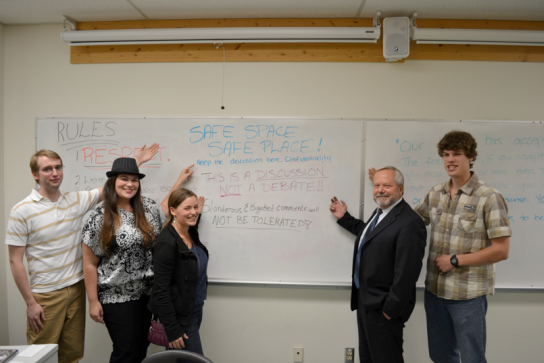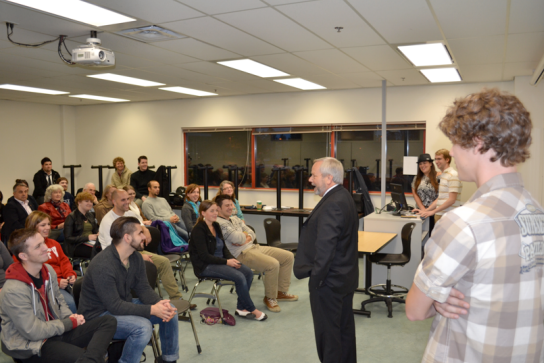Print Edition: October 24, 2012

Here’s a joke: What happens when you put a bunch of Christians and LGBTQ members in the same room and close the door?
Last Thursday, University Christian Ministries (UCM) organizer Derrick Uittenbosch and UFV Pride coordinator Teila Smart searched for the punchline as they stood together at the front of a classroom filled with members of both their clubs.
They found that, far from being a joke, the unique and risky event became profound.
The two leaders brought together their clubs to begin communication between two groups, which are known for a long and public history of antagonism. The event was focused around the showing of a documentary titled For the Bible Tells Me So, a perspective on the stigmatization of the gay community by certain religious groups.
Still, the most anticipated portion of the evening was the ensuing discussion, where audience members were given the chance to air their views on the film and other issues within a controlled environment.
“The number one rule will be respect in the room,” Smart said before the event. “Anybody who attacks or personally victimizes another individual or group, they’ll be asked to respectfully leave . . . [still,] there is a certain amount of thick skin that’s going to be needed.”
Officially the film and discussion were to run from 6 p.m. until 9 p.m., but the 40-plus audience members continued the discussion until almost 10, and even then were reluctant to leave. For Uittenbosch and Smart (who had loosely defined their vision of success as “getting through the evening without any chairs being thrown”), it was a resounding victory.
“Part of the goal here,” Uittenbosch said, before the event, “[is] to demonstrate both between the two clubs and to the larger community that we don’t have to agree with each other in order to get along.”
Both organizers stressed the need for maturity and empathy in the discussion, and were glad to successfully avoid a traditional “debate.”
“In my personal opinion, I’ve been to a lot of debates on this campus and others and I’ve become quite disheartened by the debate format,” Uittenbosch said. “Nobody shows up to a debate anymore to consider the issues logically; they show up with an agenda.”
The discussion revolved around injustices perpetuated against the gay community by religious groups, but also the need for LGBTQ individuals to avoid stereotyping all religious groups by the actions of these few.
One UCM participant commented that contrary to popular belief, the two worlds seldom acknowledge each other.
“Often I find that if you’re a Christian, you live in a bit of a bubble and you don’t see the other side. And the older I’ve been getting the more I’ve been meeting people from the LGBTQ,” the participant said. “The thing is, no one ever talks about it! I’ve specifically paid attention in my church, and only twice have I ever heard homosexuality ever mentioned in my church.”
“It’s easier to be gay with my religious friends than it is to be religious with my gay friends, and I think there’s a lot of history behind it, but also there’s a lot of assumptions,” one Pride participant noted. “Being religious to the LGBTQ I’m often met with fear and discomfort and ‘but they hate you!’ To which I respond ‘but you don’t even know them!’”
One highlight of the night was a contribution from a community audience member, who bridges both worlds.
“I was a Pentecostal minister for 18 years, so chairs flying was normal in our meetings,” he said. “I always found it quite interesting, after coming out and talking to my former minister friends, that their greatest fear was this, ‘that [the LGBTQ community members] have an agenda and that you will take over.’ And I always loved telling them ‘being gay as long as I have and meeting the gay community, they’re not that organized!’”
He later addressed the common Christian phrase “love the sinner, hate the sin.”
“I have a cousin who’s a very strong Pentecostal minister who always makes sure he tells me he loves me but not my sin,” he explained. “I always tell him ‘well, my sin is me!’”
At several points the discussion began to move into controversial territory, but members of both clubs seemed anxious to avoid the confrontation that often characterizes discussions on this topic. One Pride member even expressed interest in joining UCM at a future time.
After the event Uittenbosch was asked if his club would accept members who were also members of Pride.
“Absolutely,” he said. “Jesus spent all of his time with people he didn’t agree with, and he’s the example for us.”
Both clubs are hoping to schedule more cooperative events in the future and are positive about the event’s impact on their members and the larger community. Smart said she’d been approached by many UFV faculty and staff who told her such a discussion was “long overdue.” President Mark Evered, who was in the room for the entirety of the four hours, spoke glowingly of the “leadership” and “intellectual maturity” of those assembled.
So what do you get when you put a bunch of Christians and LGBTQ members in a room together?
At UFV, at least, you get understanding, you get empathy and you get the beginning of something beautiful.
Names have been withheld for the purpose of discretion.


